12 Grocery Items You Should Never Splurge On, According to Chefs

The grocery store is an indecisive person's worst nightmare. A slew of choices await at every turn of the aisle and decisions must be made about what to buy for meals, which brand and variety of products you should select, and what price point you're willing to pay.
Luckily, there's plenty of advice out there around the best grocery items to buy in the freezer section or in bulk, products you should never pick up in the clearance section, the most convincing store-brand alternatives, and more. Chefs have even recently opened up about foods that you always have the go-ahead to throw a little bit more cash at, such as grass-fed fresh beef and premium olive oil.
But, what about the flip side of this? We have reached out to trusted and experienced chefs once again in order to answer this question of what items you should never splurge on at the grocery store. Read on to find out which foods made the list and make sure you're not needlessly throwing money away on your next grocery haul.
'Dirty Dozen' Produce
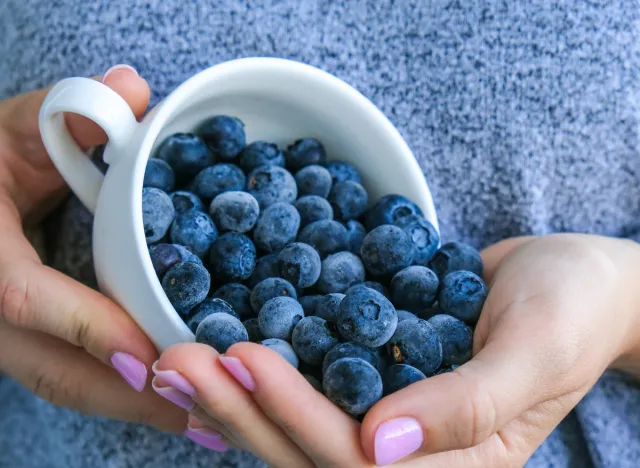
With decades of culinary experience under her belt working as a private chef for A-list celebrities and public figures from Michael Jackson to former U.S. President Barack Obama, chef Kai Chase knows a thing or two about how to allocate funds at the grocery store. And, although she says many of the recipes she creates for her celebrity clients and even herself are rooted in fresh seasonal produce, there are plenty of items within this category which she says are not worth the extra moola.
"I would never splurge on fruits and vegetables categorized on the 'Dirty Dozen' produce list," she says, referring to the nonprofit Environmental Working Group's annual ranking of non-organic fruits and vegetables with the highest levels of pesticide residue. "These include [non-organic] peaches, nectarines, kale, strawberries, blueberries, and more. Instead, I prefer to shop for these items at my local farmer's market, where these items are available organically and likely in their freshest state."
Out-of-Season Produce
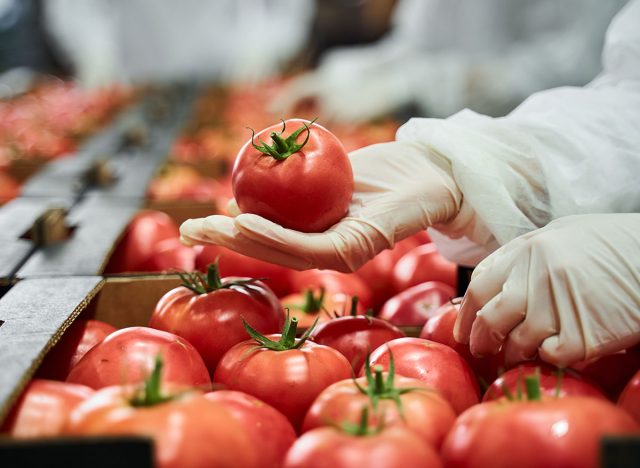
A specialty of Chase's is also to highlight only the freshest fruits and veggies within her dishes. So, she always bypasses anything that is not currently in season. She says these foods are not only more costly when they are out of season, but also less flavorful and overall less nutrient dense. "I prefer to prioritize seasonal produce in my recipes to experience fruits and vegetables how they were intended to taste!" she adds.
Pre-Made Baked Goods

Although the heavenly scents wafting over from the grocery store's baked goods section can be tempting, Chase advises to stay strong and say "no, thank you" to these sweet items. "Making baked goods at home always tastes better, and you have more control over the quality of ingredients that make it into the end product," she says. This can also help you to avoid the unhealthy preservatives typically found in store-bought baked goods that help to lengthen their shelf life, Chase notes.
Salad Dressings
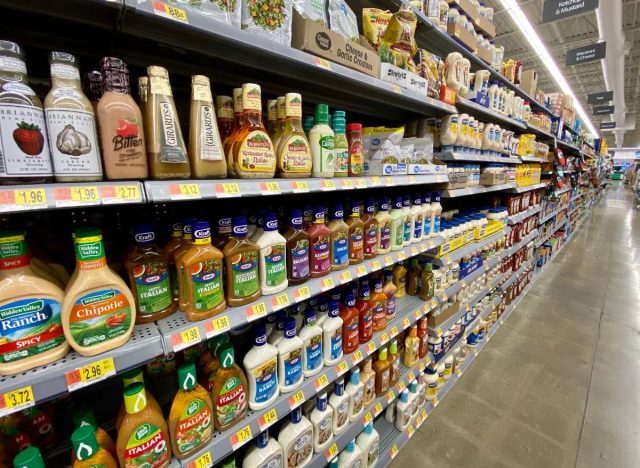
Last up on Chase's list is another item that she says is always better made at home: salad dressing. The longtime chef mentions that homemade dressings are not only more economical and easy to whip up, but they are also more flavorful, free of unnecessary artificial ingredients and preservatives, and typically lower in calories than the store-bought varieties.
For similar reasons, chef Jasmine Golden, creator of the Golden Truffle recipe blog, added pre-made salad dressing to her grocery store no-splurge list as well. She suggests making your own with healthier ingredients like olive oil and vinegar instead.
Prepackaged Frozen Meals
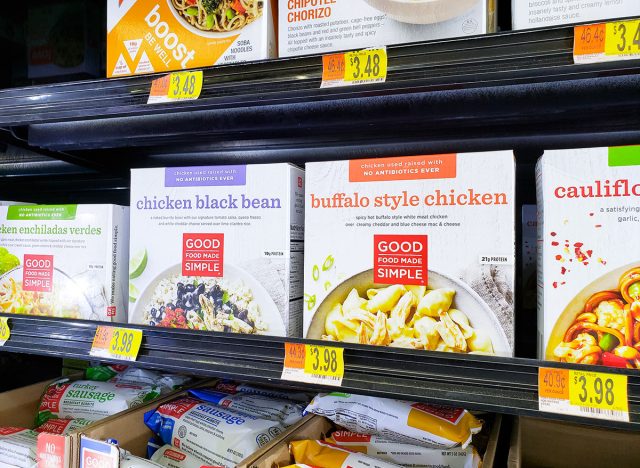
In the freezer aisle, Golden skips over prepackaged frozen meals, which she says "can be expensive and often contain unhealthy ingredients such as added sugar, salt, and preservatives." These unwanted additives tend to make these selections higher in calories and they also provide close to nothing in the way of nutritional value. As a healthier alternative that won't cost you a fortune, she recommends cooking your own meals at home from fresh, whole ingredients.
Soda and Other Sugary Drinks

"Sugary drinks like sodas, juices, sports drinks, and energy drinks are full of empty calories that provide no nutritional benefits," Golden continues. "They can also cause weight gain and dental problems due to their high sugar content. Additionally, these beverages can be expensive and may not even quench thirst as well as water." To help you protect your health and your wallet, opt for something like herbal tea or just plain water—a much more economical choice.
Energy Bars
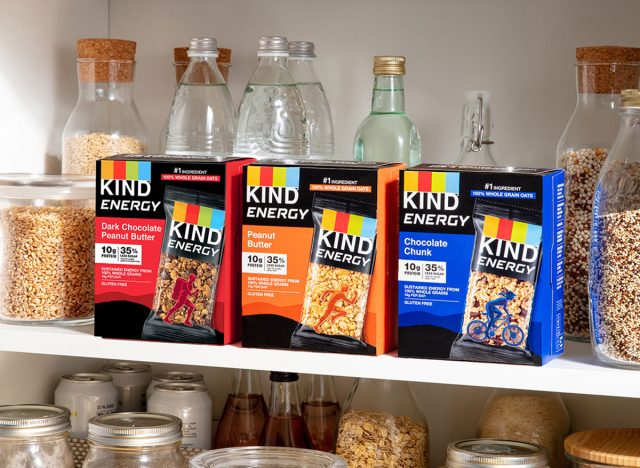
Evidently, energy comes at a premium cost when you buy it in bar form. Golden says these products may masquerade as a convenient and healthy snack choice, but they are often overpriced and "many of them contain added sugars and unhealthy fats that can contribute to weight gain." She offers up raw foods such as nuts, fruits, or vegetables as smarter substitutes.
Processed Meats
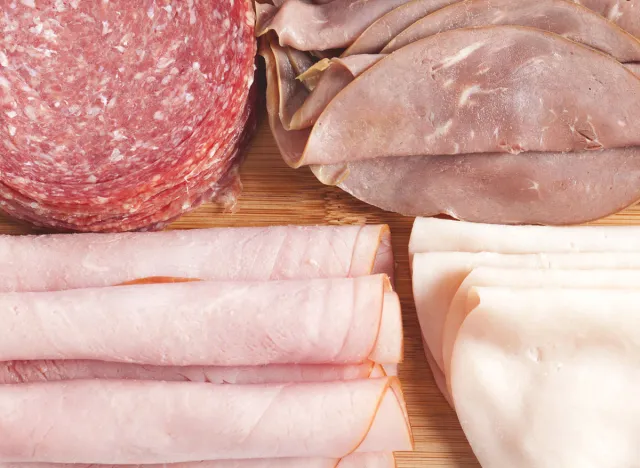
Processed meats are any meats that have been altered through methods such as smoking, salting, or curing in order to lengthen their shelf life. And, according to Golden, it's best to steer clear of these meats when you stumble upon them at the grocery store. "Processed meats such as bacon, ham, and hot dogs can be high in calories and fat," she explains. "Additionally, they are often loaded with sodium and artificial preservatives, which can increase the risk of certain diseases. For these reasons, it is best to avoid overspending on processed meats and opt for healthier sources of protein such as fish, legumes, or eggs instead."
Branded Spices
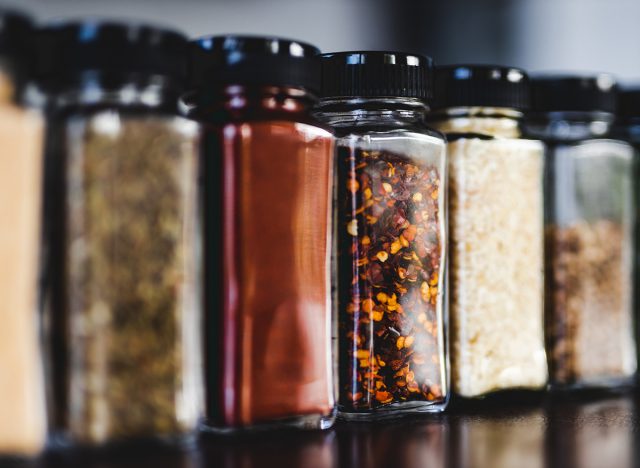
As creator of the food blog YummyTasteFood and established pastry chef with experience working at some of the world's largest hotel chains including the Ritz-Carlton and Four Seasons, Norah Clark has some noteworthy pieces of advice when it comes to grocery shopping. Most importantly, she says "it's wise to focus on quality and value when shopping for groceries and avoid overspending on items that don't offer significant benefits in terms of taste or nutrition."
With that being said, she calls out branded spices as something to sidestep at the store. She explains that "store-brand spices are often just as flavorful and high-quality as their name-brand counterparts but at a fraction of the cost."
Bottled Water

As Golden pointed out earlier, swapping out sugary drinks like soda and juice for water is a great way to save money on your grocery bill. But, not if you're picking up store-bought bottled water, according to Clark. She says drinking tap water is much cheaper (you're likely already paying a water bill anyway), more eco-friendly since it eliminates the need for single-use plastic, and it's just as good as bottled water unless you happen to live in an area with water-quality issues.
Premium Pasta Sauces
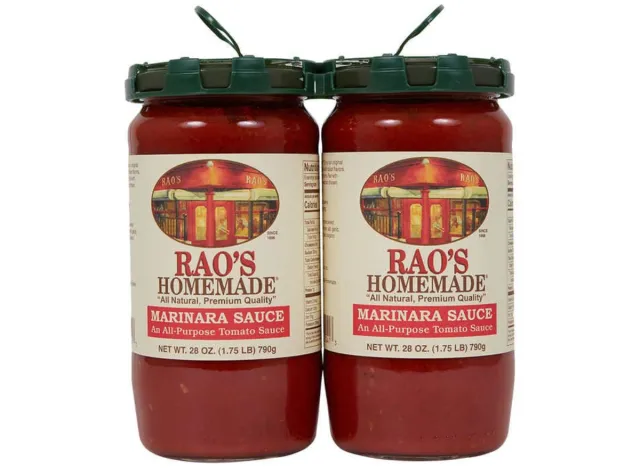
Most grocery stores are stocked with an overwhelming amount of fancy-looking pasta sauces from marinara to pesto. It can be fun to treat yourself to one of these specialty options, but Clark warns that the prices can be both inflated and unnecessary. "High-quality homemade pasta sauce is often more flavorful and affordable than store-bought," she admits. "You can create a delicious sauce tailored to your taste preferences with just a few simple ingredients."
Gourmet Salts
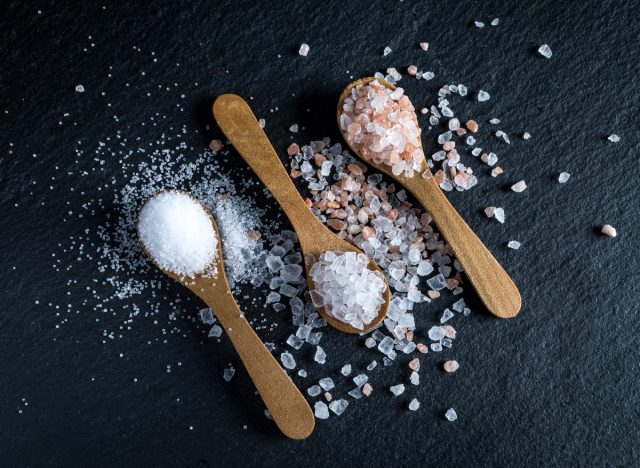
To round out her list of items not to splurge on, Clark sprinkled in gourmet salts. "Most people can't tell the difference between gourmet and regular table salt, so save your money and stick with the latter for everyday cooking," she says. Be sure to follow her advice so you don't end up "salty" when you see your grocery bill.








